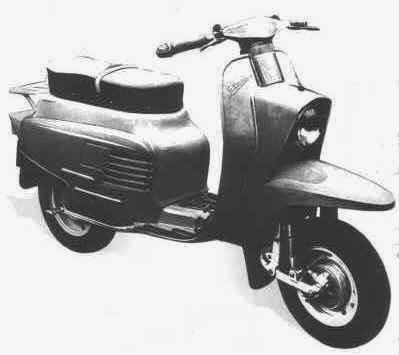Vyatka VP-150 (1957-1966)
With such short deadlines given, the Vyatskiye Polanski
Machine Works decided not to start from scratch but virtually make a direct
copy of the Vespa 150GS which was in series production in Italy from 1955. Even the logo was very similar to the Vespa, which showed no creativity from the copiers'part. Compared
to the Vespa 150GS the steel used was much thicker which made the overall weight 16kg
heavier. It was 4cm longer and had larger wheels. Its 4.5hp 150cc engine powered a
3 speed gearbox to a maximum speed of 70kph compared to the Italian’s 8hp
powering an economical 4 speed gearbox to a top speed of 100kph. The comparative stats are for the GS, while the standard Vespa 150 in 1957 only produced 5.4hp with a top speed of 80kmp, which made the heavier Vyatka not a bad choice for the rural backwaters of Mother Russia.
It had a round dashboard compared to the slightly oval one
of the Vespa. Since 1960 a red soviet style star appeared on the front wheel arch and the power was increased
to 5.5hp similar to the standard Vespas coming out of Italy. It was sold cheaply at 350 rubles, unsurprisingly the Vyatkas became
very popular. Over 300,000 VP-150 were built but due to pressure from Piaggio
production was stopped.
V-150M Vyatka-Electron (1974-1979)
The next model had more of a Lambretta style to the design,
made from tubular steel compared to the mono chassis of the earlier model. Using
the same engine as the VP-150 but centrally mounted, the power was increased to
7,5hp and a top speed of 80kph. The V-150M came equipped with an electronic
ignition and it was made more affordable with the selling price dropping to 280
rubles.
But the popularity was steadily declining due to some bad
marketing policies and by 1974 production was stopped with over 1 million
produced. The stock continued to sell until 1989 and it took till 1999 for all
the excess spares to be sold out.
Tula Tulitza 200 (1957-1987)
The Work TMZ, also started making scooters but these were
based on the German scooter, Glas Goggo TGA-200F which in turn is based off the
Lambretta.
1987 Tula Tulitza 200
In the late 1960s a 3 wheel started being produced and is
still in production.
Molot Strizh (1999-Current)
The Vyatskiye Polanski Machine Works changed its name to Molot and started building scooters again in 1999.
















0 comments:
Post a Comment